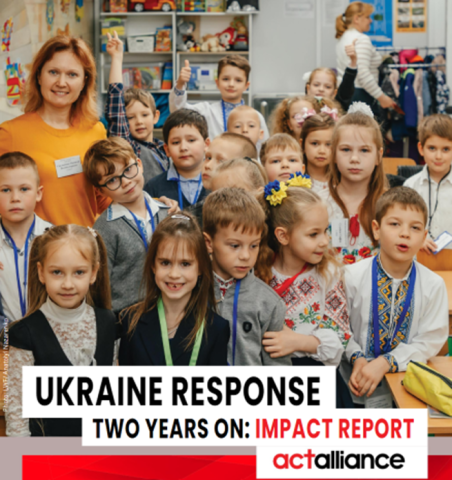Learn about the impact of your donations and how The United Church of Canada partners with ACT to respond to emergencies around the world.

In response to the staggering reality that 120 million people worldwide are displaced—three times the population of Ukraine—ACT Alliance is making a significant impact in the lives of people affected by the war. The church’s collaboration with ACT Alliance has made a significant contribution to providing critical support and resources to those in dire need.
Through the ACT Ukraine appeal, over 400,000 Ukrainians who fled to neighbouring countries like Poland, Slovakia, Hungary, Romania, and Moldova have received essential aid. This life-saving assistance demonstrates the power of collective action and compassion in the face of global crises.
For a detailed overview of the ongoing efforts and stories, you can read the ACT Alliance Impact Report.
Visit our Ukraine appeal page for more details on how to contribute to and support The United Church of Canada's partnership with ACT Alliance in this effort. The need is great and continuing. Your support will help children and families now and in the future.
Another way to support is through advocacy. Your voice matters in efforts for global justice and peace. We encourage you to advocate for Canada to play an active role in supporting negotiations between conflicting parties and pushing for an immediate end to wars, occupations, and violence. By calling on our leaders to prioritize diplomatic solutions and peacebuilding efforts, you can help protect lives and prevent further displacement of vulnerable communities. Consider writing to your MP about this issue. We have resources on faithful advocacy on our Faith and Politics page.
What Is ACT Alliance?
ACT Alliance, or Action by Churches Together, is a global coalition of over 150 churches and church-related organizations. Founded in 2010, the alliance focuses on humanitarian relief, development, and advocacy for social justice. Operating in over 100 countries, ACT Alliance pools resources and expertise from its members to effectively respond to emergencies, support long-term development, and promote human rights.
How Does The United Church of Canada Partner with ACT Alliance?
The United Church is a member of ACT and collaborates with ACT Alliance in several key ways:
- Emergency response: The church works with ACT Alliance to provide immediate assistance during crises and disasters, as well as to respond to protracted crises. For example, in response to the ongoing conflict in Ukraine, The United Church of Canada has supported ACT Alliance’s efforts to deliver essential aid to displaced Ukrainians. Some Mission and Service global partners are also members of ACT Alliance.
- Advocacy: The church engages in fundraising activities and advocacy to support ACT Alliance’s emergency appeals and development projects. These efforts help raise necessary funds and awareness of pressing humanitarian needs.
- Resource sharing: Membership in ACT Alliance allows The United Church of Canada to access a broad network of expertise and resources. This collaboration ensures that emergency response is effectively coordinated and reaches those most in need.
- Development projects: In addition to immediate relief, the church and ACT Alliance work together on human rights initiatives such as climate justice, gender justice, migration and displacement, and peace and human security.
Through its membership with ACT Alliance, the United Church demonstrates a strong commitment to alleviating suffering and promoting justice on a global scale. This collaboration enhances our collective capacity to make a meaningful impact and support those affected by crises.
Learn More about the Work of Global Partnership
Would you like to accompany the Global Partnership Team on our journey of daring justice, bold ideas, and deep radical accompaniment? Follow the United Action for Justice pages on Facebook, Twitter/X, and Instagram.
The Global Partnership Team engages many partner organizations around the world who work in a myriad of areas, including economic justice, human rights, food security/sovereignty, militarism and violence, water rights, refugees and migration, climate change, and many other interconnected issues.